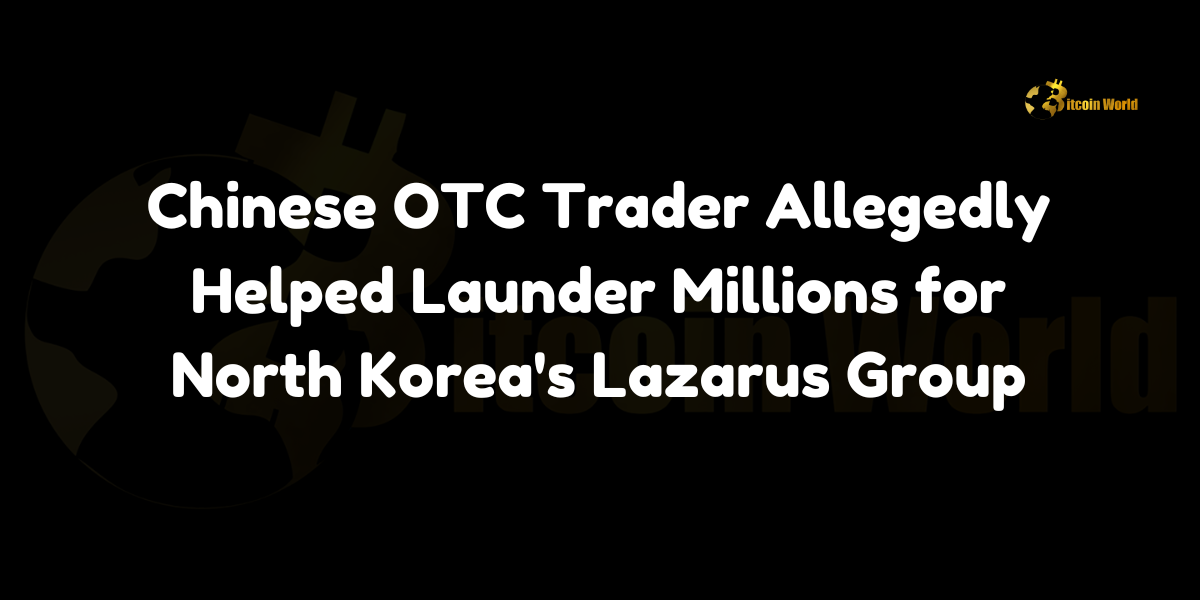Chinese OTC Trader Allegedly Helped Launder Millions for North Korea’s Lazarus Group
In a significant development within the cryptocurrency and cybersecurity sectors, On-chain analyst ZachXBT revealed on X (formerly Twitter) that a Chinese over-the-counter (OTC) trader named Yicong Wang has been accused of laundering over $17 million in stolen cryptocurrency for North Korea’s Lazarus Group since 2022, as reported by Cointelegraph. Wang is alleged to have played a crucial role in converting cryptocurrencies into cash for the hackers behind several high-profile crypto heists.
Overview of the Allegations
Who is Yicong Wang?
Yicong Wang is a prominent Chinese OTC trader known for facilitating large cryptocurrency transactions between buyers and sellers outside of traditional exchanges. OTC trading, while offering privacy and flexibility, has also been scrutinized for potential misuse in money laundering and illicit activities.
What is the Lazarus Group?
The Lazarus Group is a notorious North Korean state-sponsored hacking organization responsible for numerous cyberattacks worldwide, including the infamous Sony Pictures hack in 2014 and the WannaCry ransomware attack in 2017. The group has increasingly targeted the cryptocurrency sector, exploiting its pseudonymous nature to launder funds obtained through cyber heists.
Details of the Laundering Scheme
According to the allegations, Yicong Wang facilitated the laundering process by:
- Converting Stolen Cryptocurrencies into Fiat Cash: Wang is accused of receiving stolen cryptocurrencies from the Lazarus Group and converting them into fiat currencies through various channels, thereby obscuring the origin of the funds.
- Utilizing Layered Transactions: The laundering process reportedly involved multiple transactions across different platforms and wallets to further mask the trail of the stolen assets.
- Collaborating with Other Actors: Wang is alleged to have worked in tandem with other individuals and entities to enhance the complexity and effectiveness of the money laundering scheme.
Implications for the Cryptocurrency Market
Increased Scrutiny and Regulation
These allegations have heightened the scrutiny on OTC trading platforms and individual traders involved in large-scale cryptocurrency transactions. Regulators worldwide are likely to intensify their efforts to monitor and regulate OTC trading to prevent its misuse for illicit activities.
Impact on Market Trust
Such high-profile accusations can erode trust in the cryptocurrency market, particularly in OTC trading. Investors and legitimate traders may become more cautious, potentially impacting the liquidity and volume of OTC transactions.
Enhanced Due Diligence Requirements
Financial institutions and cryptocurrency exchanges may implement stricter Know Your Customer (KYC) and Anti-Money Laundering (AML) protocols to identify and prevent suspicious activities, thereby increasing the compliance burden on market participants.
Efforts to Combat Crypto-Related Money Laundering
International Cooperation
Combating crypto-related money laundering requires robust international cooperation. Law enforcement agencies across different countries are likely to collaborate more closely to track and apprehend individuals involved in such schemes.
Technological Solutions
Advancements in blockchain analytics and artificial intelligence are being leveraged to detect and prevent money laundering activities. Companies specializing in blockchain forensics are expected to play a pivotal role in identifying suspicious transactions and providing actionable intelligence to authorities.
Strengthening Regulatory Frameworks
Governments are expected to strengthen regulatory frameworks governing cryptocurrency transactions, particularly in the OTC sector. This includes mandatory reporting of large transactions, enhanced KYC requirements, and penalties for non-compliance.
Expert Opinions
Dr. Emily Carter, Blockchain Analyst
“The allegations against Yicong Wang underscore the vulnerabilities within the OTC trading ecosystem. While OTC trading offers benefits in terms of privacy and liquidity, it also presents significant risks if not properly regulated. Enhanced oversight and technological innovations in blockchain analytics are essential to mitigate these risks.”
Mark Thompson, Financial Strategist
“Money laundering remains one of the most pressing issues in the cryptocurrency market. The involvement of high-profile groups like Lazarus highlights the need for comprehensive regulatory measures and international cooperation to safeguard the integrity of the crypto ecosystem.”
Sarah Lee, Cybersecurity Researcher
“The Lazarus Group’s continued targeting of the cryptocurrency sector demonstrates their adaptability and the evolving nature of cyber threats. It’s imperative that both the private and public sectors invest in advanced security measures and collaborative efforts to prevent and respond to such illicit activities.”
Future Outlook
Strengthening Compliance Mechanisms
The cryptocurrency industry is likely to witness a surge in the implementation of advanced compliance mechanisms. This includes real-time transaction monitoring, enhanced KYC processes, and the integration of blockchain analytics tools to detect and prevent money laundering activities.
Rise of Regulated OTC Platforms
In response to increased regulatory pressure, we may see a rise in the number of regulated OTC trading platforms that comply with stringent AML and KYC standards. These platforms will offer a safer environment for legitimate traders while deterring illicit actors.
Increased Penalties and Legal Actions
Governments and regulatory bodies are expected to impose harsher penalties on individuals and entities involved in crypto-related money laundering. This will serve as a deterrent and reinforce the importance of maintaining a clean and secure cryptocurrency market.
Conclusion
The allegations against Yicong Wang for laundering over $17 million in stolen cryptocurrency for North Korea’s Lazarus Group highlight the ongoing challenges in combating illicit activities within the cryptocurrency sector. As the industry continues to grow and mature, the need for robust regulatory frameworks, advanced technological solutions, and international cooperation becomes increasingly critical to ensure the integrity and security of the market.
While OTC trading remains a vital component of the cryptocurrency ecosystem, these developments underscore the importance of balancing privacy and liquidity with security and compliance. Stakeholders across the industry must work collaboratively to address these challenges, fostering a safe and trustworthy environment for all participants.
To stay updated on the latest developments in cryptocurrency regulation and cybersecurity, explore our article on latest news, where we cover significant events and their impact on digital assets.
Disclaimer: The information provided is not trading advice, Bitcoinworld.co.in holds no liability for any investments made based on the information provided on this page. We strongly recommend independent research and/or consultation with a qualified professional before making any investment decisions.

